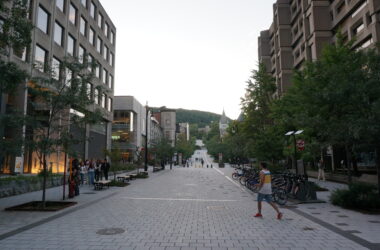Dear Ainsley,
I’m going into my third-year in September, and even though it’s far away, the thought of graduate school is already weighing heavily on my mind. I’m fairly certain my GPA will be good enough to get into the schools I want to apply to, but I feel like I don’t have good relationships with my teachers. I’ve been told so many times that to get into grad school you need at least a couple good recommendation letters from your professors, but so far I have none. How do I go about developing a strong relationship with a professor so I can land a good recommendation letter?
Sincerely,
Restless about Rec Letters (RARL)
Dear RARL,
Good for you for already thinking about life post-undergrad. It’s easy to get caught up in life at McGill, and to forget that once we’re finished with these four short years—or in some cases, three—we’re left to fend for ourselves. Connections are crucial to getting ahead in the job market and in the race to graduate school; scoring a good recommendation letter will undoubtedly give you a leg up in both. The first step to doing so is to make connections with your professors.
On the one hand, we are privileged to attend a large research university. McGill has hundreds of school clubs, some of the best professors in North America, and endless opportunities to explore different career paths. On the other hand, many of us face the ‘small fish in a big ocean’ problem. It’s hard to set yourself apart from others when there are thousands of other hardworking, intelligent students potentially vying for the same spot and attention as you. It doesn’t help that in many programs, classes can have up to 600 students enrolled. You’re easily forgotten in a lecture hall if you don’t do your best to make an impression.
If you’re in the Faculty of Arts, consider looking for classes or seminars that are smaller, or try doing a one-on-one independent study with a professor. Once you get to your upper years, classes typically have a better professor to student ratio, allowing most of the networking to get done on its own. If taking smaller classes isn’t possible for your program, do your best to speak up in class. By continuing to do this, your professor may start to recognize you and immediately look to you for any discussion questions they may have. This is also made easier if you sit in the front of the lecture hall. Also, in my opinion, it’s a lot less daunting to answer or ask a question in class if you can’t see the other students sitting in front of you.
Another way to stand out in the eyes of your professors for large lectures is to stay after class to ask questions, taking the time to introduce yourself to the professor, and showing interest in the course material will really set you apart from other students. If you can’t think of anything to ask teachers after class, or are in a rush to get to your next class, office hours are another great opportunity to get to know your professor. Taking the time to show up can really show your professor how much the class means to you. Try coming up with some questions from your readings beforehand so you have something to talk to them about—the more specific the question, the better, as it shows the depth at which you have been studying the material.
If you have some extra time on your hands, consider running for your faculty or departmental student association. Student association members often work closely with professors to organize research panels and networking events, which is a great way to get on a first-name basis with a professor. If you’re already tied up with extracurricular activities, do your best to attend as many events as possible, and consider staying afterwards to talk to professors about their research. In any given week, there should normally be at least a couple relating to your field of study.
Even though we have a seemingly long time at McGill, the years go by quickly. Balancing class workload, extracurricular activities, and social life often takes precedence over planning for the future. Do your best to get your foot in the door with your professors early, and you’ll thank yourself come graduation.
Best of luck,
Ainsley








